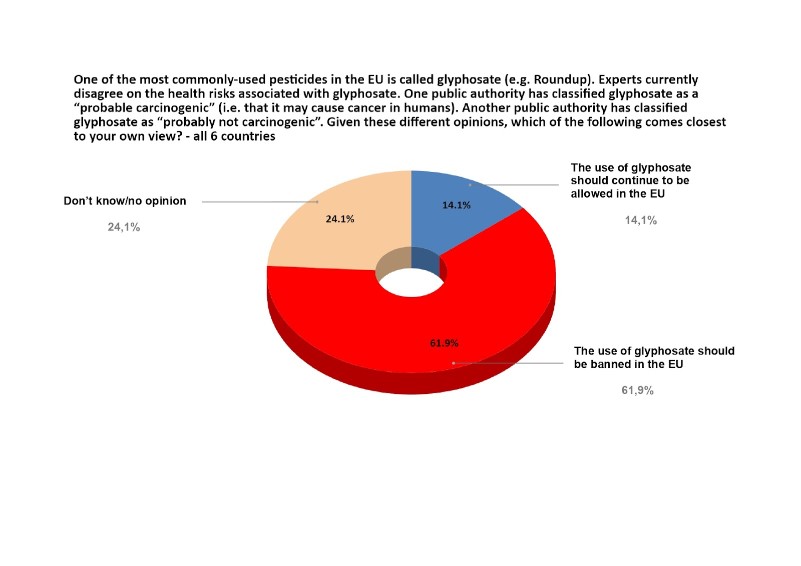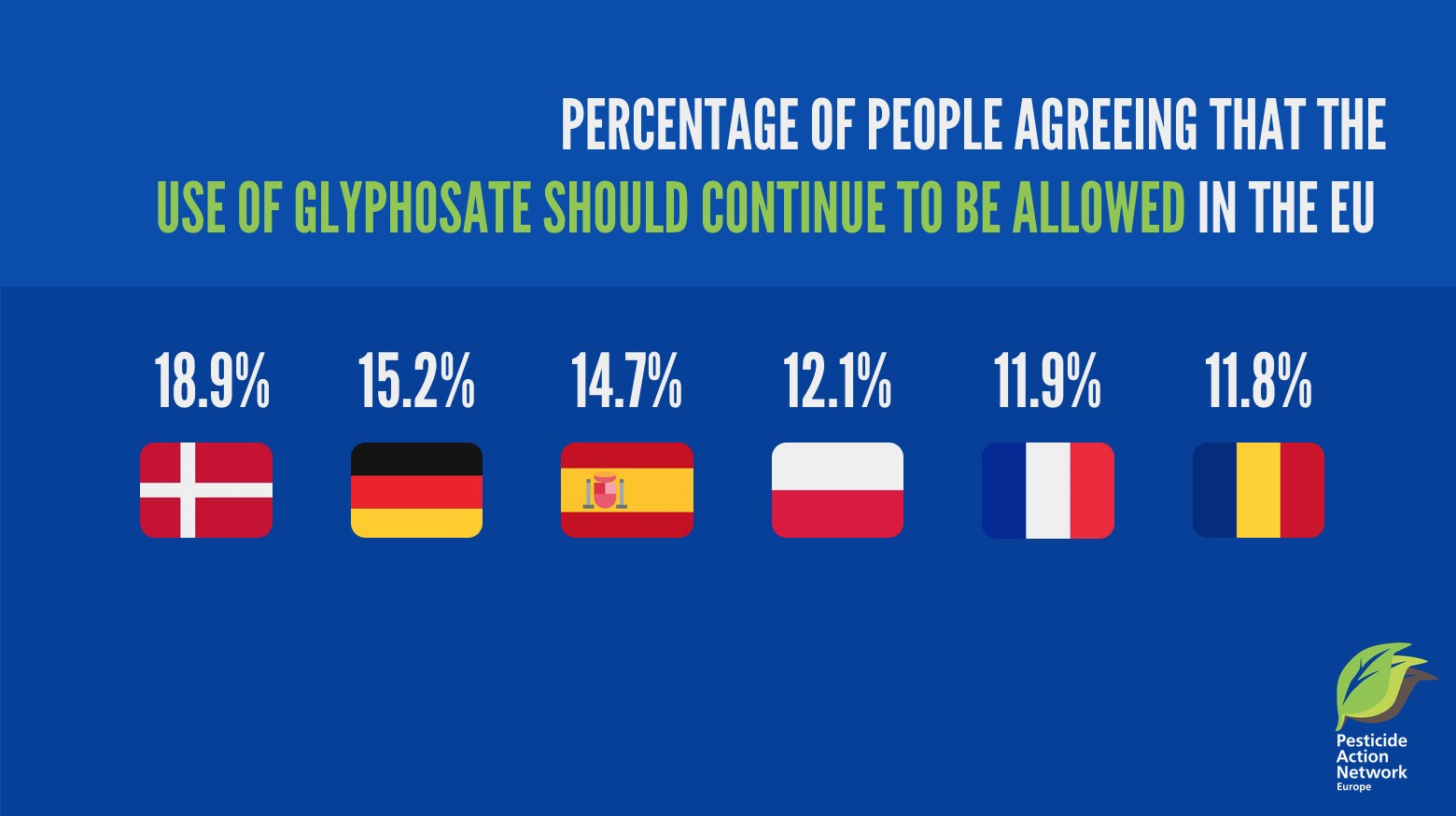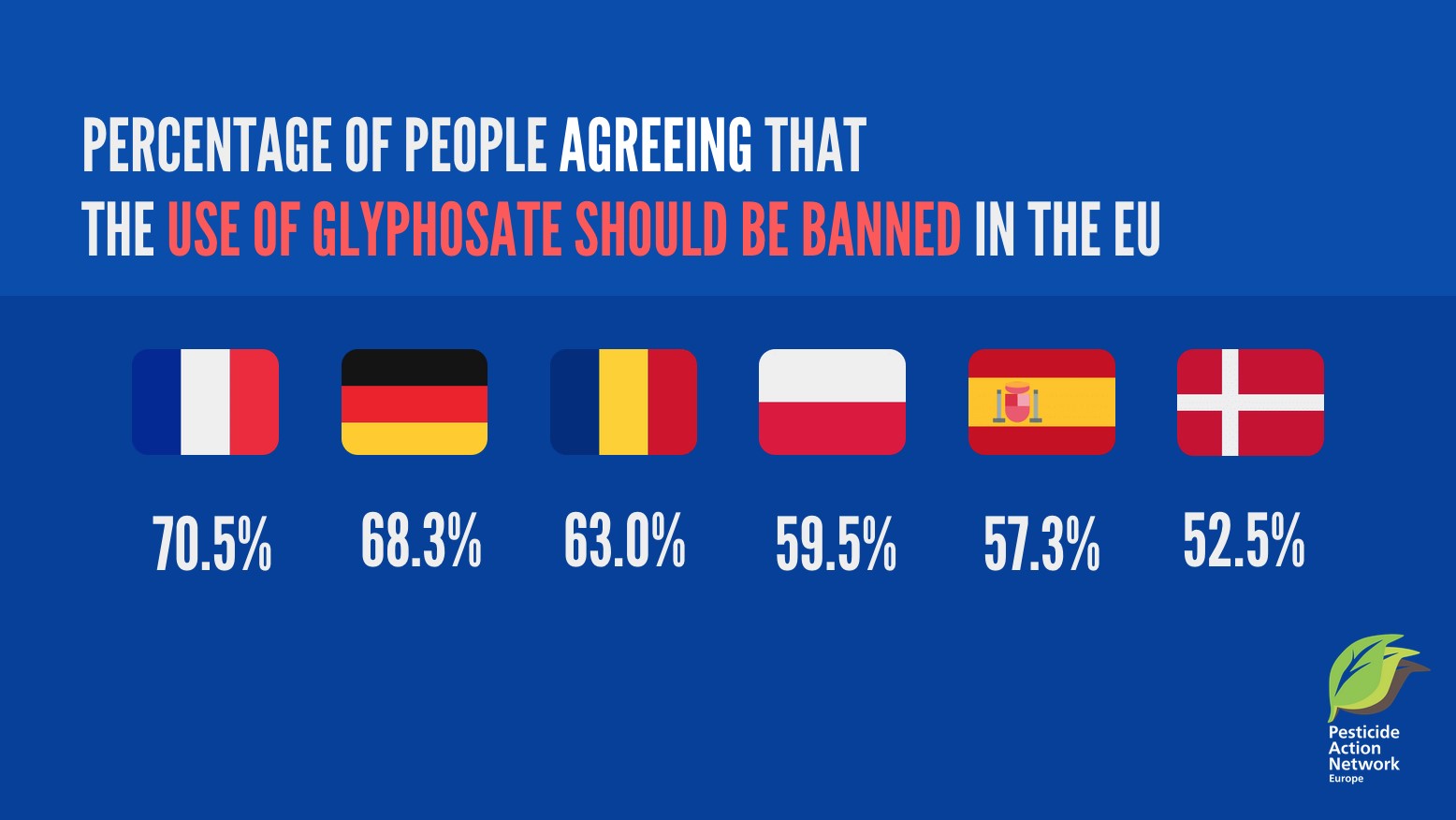What do European citizens think of pesticide use, and more specific: what do they think about glyphosate? We have asked IPSOS to conduct an online representative public opinion poll in six countries: Denmark, France, Germany, Poland, Romania and Spain. The results of the full poll will be presented later in September. We have singled out the question on glyphosate, because the renewal of Europe’s most used herbicide is the topic of a heated debate and will be discussed in the EU Council’s SCoPAFF committee on September 15th, with a vote expected to follow in October.
The following question was asked to the respondents:
Q7. One of the most commonly-used pesticides in the EU is called glyphosate (e.g. Roundup). Experts currently disagree on the health risks associated with glyphosate. One public authority has classified glyphosate as a “probable carcinogen” (i.e. that it may cause cancer in humans). Another public authority has classified glyphosate as “probably not carcinogenic”.
Given these different opinions, which of the following comes closest to your own view?
- The use of glyphosate should continue to be allowed in the EU
- The use of glyphosate should be banned in the EU
Across the 6 EU Member States in scope for this study, the survey showed that approaching two-thirds (62%) of respondents believe that the use of glyphosate should be banned in the EU, while 14% of the citizens believe that the use of glyphosate should continue to be allowed in the EU. Almost 1 in 4 of them (24%) did not express an opinion on this.

If we look at the individual countries we see the following picture:
Only fewer than two in ten respondents across the six surveyed countries agree that the use of glyphosate should continue to be allowed in the EU

Between five and seven in ten respondents in the six surveyed countries agree that the use of glyphosate should be banned in the EU

Glyphosate renewal procedure
The EU authorisation of glyphosate ends in December 2023. The manufacturers have asked for a renewal. On July 6, 2023, EFSA issued its long-awaited Conclusion on the assessment of the impact of glyphosate on the health of humans, animals and the environment. The European Food Safety Agency pointed out that the assessment of the potential genotoxicity of impurities, the risk assessment for consumers and the risk assessment for aquatic plants remain incomplete. However, despite data gaps identified by EFSA, the Agency declares no "critical areas of concern" for human, animal and environmental health related to the use of glyphosate in agriculture. EFSA's conclusions have outraged civil society organisations, who denounce a political decision to pass the buck to the Commission and Member States.
The European Commission has used the EFSA opinion to propose a renewal. Now discussions will then take place between representatives of EU Member States in the SCoPAFF committee to find an agreement and vote on the Commission’s proposal. The first discussion will take place on September 15. The vote is expected in October. If a qualified majority of member states supports the proposal, the renewal authorisation will be granted. If there is a simple majority, the European Commission may refer it to the Appeal Committee.
End this toxic story
In 2017 over 1 million European citizens demanded a ban on glyphosate in an European Citizens Initiative. Instead of a ban the toxic substance was allowed to be used on a massive scale for another 5 years to damage our health, poison water and soil and decimate biodiversity. We were told these years were necessary to phase out glyphosate. The time is up and now the time has come to end this toxic story once and for all.
More information on alternatives, the procedure, the role of industry and links to 80 recent independent scientific studies that prove the damage done by glyphosate and its products: Stop Glyphosate.
Contacts: Tjerk Dalhuisen, tjerk [at] pan-europe.info, +31 614699126
About IPSOS and the poll
IPSOS - Institut Public de Sondage d'Opinion Secteur) is a multinational market research and consulting firm with headquarters in Paris, France. Ipsos is one of the three largest market research and advisory companies in the world and currently the only such large global company primarily managed by researchers. Headquartered in Paris, it has over 19,000 employees across 90 countries.
The survey was conducted between 3 and 10 August 2023 in six EU Member States: France, Germany, Romania, Poland, Spain and Denmark. In each country, the target population was adults aged 18 and over and the target sample size was 1,000 per country. In total, 6,059 interviews were completed across the six countries.
The survey was conducted using Computer Assisted Web Interviewing (CAWI) or online methodology, with the sample drawn from Ipsos’ nonprobability/volunteer Online Access Panels. Prospective respondents were randomly sampled, with quotas applied to ensure a representative sample. Quota sampling aims to represent the major characteristics of the population of interest by sampling a proportional amount of each. For this project, quotas were set, and the profile of the emerging sample monitored, in terms of gender, age and region (not interlocked), based on latest available population statistics.
To ensure a homogenous approach across countries and minimise potential errors, questionnaire programming, data cleaning, and analysis were fully centralised. Post-survey corrective weighting was applied to the data as follows: 1) “in country” or national weights were applied for each country surveyed, based upon gender, age group and geographic region; 2) cross-country weights were calculated to allow estimates to be obtained for the whole sample and for any combination of countries such that the weighted sample size for each country would be proportionate to the size of its eligible population.
